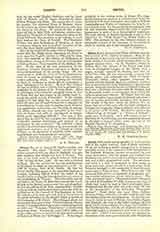

Diceto, RALPH DE, dean of St. Paul’s, London, and chronicler. The name “Dicetum” cannot be correctly connected with any place in England; it is possible therefore that Ralph was born in France. The date of his birth must be placed between 1120 and 1130; he died November 22, 1202. He was twice a student at Paris. His first preferment was the archdeaconry of Middlesex to which he was nominated in 1152. In 1180 he became dean of St. Paul’s. He was the friend, during fifty years, of the successive bishops of London, including Gilbert Foliot, the leader of the royalist party among the bishops and the adversary of the Archbishop, St. Thomas. This friendship and his admiration for Henry II drew him towards the royalist side in the Becket controversy, but not altogether; he had something of the wide, cosmopolitan, twelfth-century outlook, and he showed his sympathy with his archbishop at the Council of Northampton in 1164. He was an active dean and took part in the survey of the lands belonging to the chapter which is known as the Domesday of St. Paul’s, His writings include two substantial historical works: “Abbreviationes Chronicorum”, a compilation from many sources going back to 1147, and “Ymagines Historiarum”, a much more important work. It covers the years 1149 to 1202, and in its earlier portion is based on the historical writings of Robert de Monte (or “de Torigny”). It was begun probably in the closing years of Henry II‘s reign. Ralph’s important position in ecclesiastical circles, his friendship with many prominent men, such as William Longchamp and Walter of Coutances, the help he received from them, the documents he incorporates, and his own moderate temper render his work of capital importance in spite of some chronological vagueness. The best edition of Ralph’s historical works is that edited for the “Rolls Series” by Bishop Stubbs in 1876. The prefaces to the two volumes contain an admirable account of the historian, of the society in which he moved, and of the writings themselves.
F. F. URQUHART

